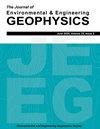风化尾矿下电阻率动态对环境温度的响应
IF 0.7
4区 工程技术
Q4 ENGINEERING, GEOLOGICAL
引用次数: 3
摘要
矿石开采加工场是开放的技术系统,受环境因素的影响,随时间变化剧烈。这种“技术矿床”的积极转化与环境因素密切相关。本文的目的是确定矿山尾矿库电阻率随时间变化的性质和原因。研究采用电断层扫描法进行,在白天每隔一小时测定1.5 m深度剖面的电流,同时记录0.1 m深度的物质温度。在强烈转化的工艺矿石上观察到最大的日内能动力学。电流变换器与固体的温度呈指数关系,其确定性为96%。利用Archie定律揭示了ER日变化幅度与胶结指数m的直接关系。堆的主要材料具有单分散成分和较小的m值,因此ER动力学的振幅最小。由于氧化转化,排土场的固体物质变得多分散,这反映在胶结指数和ER日振荡幅度的增加上。本文章由计算机程序翻译,如有差异,请以英文原文为准。
Electrical Resistivity Dynamics Beneath the Weathered Mine Tailings in Response to Ambient Temperature
Ore mining and processing dumps are open and technogenic systems, which change intensively with time under the influence of environmental factors. Active transformations of such “technogenic deposits” are in close relationship with environmental factors. The purpose of this paper is to determine the nature and causes of the electrical resistivity (ER) changes in the mine tailings dump over time. The investigations were carried out by the method of electrotomography by determining the ER of the section to a depth of 1.5 m with an interval of one hour during the day with simultaneous recording of the substance temperature at a depth of 0.1 m. The maximum daily ER dynamics is observed over intensely transformed technogenic ores. ER is in a numerical relationship with the temperature of the solid matter by an exponential law with a certainty of 96%. A direct dependence of the ER daily changes amplitude on the cementation index m was revealed with the help of the Archie law. The primary material of the heap has a monodisperse composition and small values of m, so the amplitude of the ER dynamics is minimal. As a result of oxidative transformations, the solid matter of the dump becomes polydisperse, which is reflected in the cementation index and the amplitude of the ER daily oscillations increase.
求助全文
通过发布文献求助,成功后即可免费获取论文全文。
去求助
来源期刊

Journal of Environmental and Engineering Geophysics
地学-地球化学与地球物理
CiteScore
2.70
自引率
0.00%
发文量
13
审稿时长
6 months
期刊介绍:
The JEEG (ISSN 1083-1363) is the peer-reviewed journal of the Environmental and Engineering Geophysical Society (EEGS). JEEG welcomes manuscripts on new developments in near-surface geophysics applied to environmental, engineering, and mining issues, as well as novel near-surface geophysics case histories and descriptions of new hardware aimed at the near-surface geophysics community.
 求助内容:
求助内容: 应助结果提醒方式:
应助结果提醒方式:


